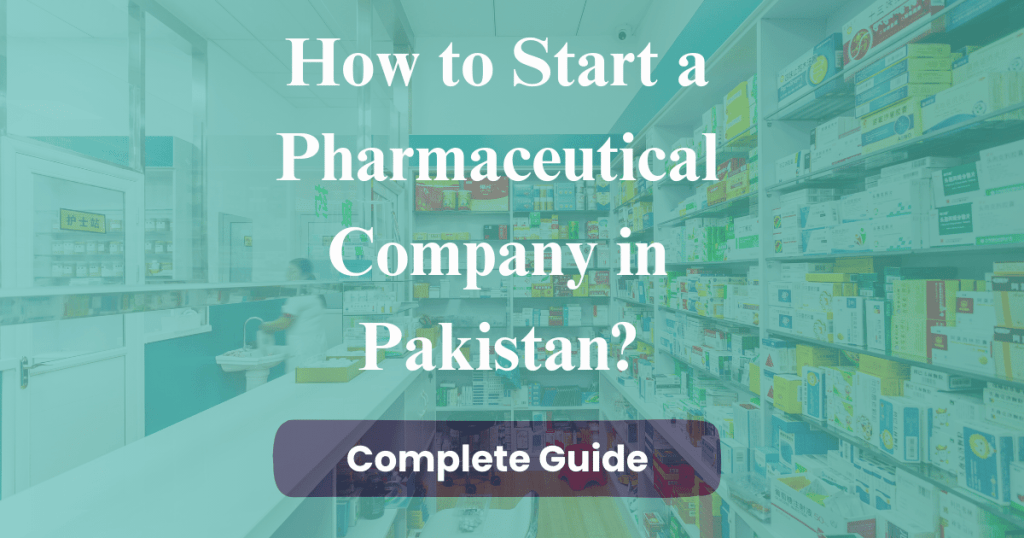
Pharmaceutical companies, also known as drug manufacturing companies which is licensed for commercial businesses that are established to research, manufacture, market and distribute drugs /medicines for the healthcare system, the work of this industry is subject to a variety of strict rules and regulations as it involves human lives.
Pharmaceutical laws relate to the creation, sale, distribution, and use of pharmaceutical drugs. These laws include intellectual property rights to protect drug manufacturers’ research, safety standards to protect the public from harmful side effects, restrictions on marketing drugs to the public, and rules regarding how drugs may be prescribed and distributed.
In Pakistan, 80% of the domestic need for medicine is fulfilled by local manufacturing whereas the other 20% is through imports. Suppose anybody wishes to establish a pharmaceutical unit. In that case, he/she needs to provide a copy of the National Identity Card, deed/lease document of the land/plot, information about the company/firm, its directors or partners and the sketch of the proposed site.
Please contact us on WhatsApp if you need any instant assistance with taxation and secp services in Pakistan. You can also visit our Office in Karachi and Sukkur, or visit our website for more information.
Here’s a step-by-step guide to establishing your own pharmaceutical business in Pakistan.
Pharma Startup Cost Estimator
1) Understanding the Regulatory Landscape:
i) Research DRAP Regulations:
Familiarize yourself with the Drug Act and other relevant regulations enforced by DRAP. These include licensing requirements, Good Manufacturing Practices (GMP), import/export regulations, and quality control procedures.
2) Develop a Business Plan:
Like any business, a solid business plan is essential. Conduct a feasibility study to understand market needs, competition, and potential profitability. Outline your business goals, target market, product line, and marketing strategy in detail.
- Market Research: Conduct thorough market research to identify opportunities, competition, and market demand for pharmaceutical products in Pakistan.
- Business Model: Define your business model, specifying the types of pharmaceutical products (generic, branded, etc.) you intend to manufacture, import, or distribute.
- Financial Planning: Prepare a detailed financial plan covering startup costs, operational expenses, pricing strategy, and projected revenue.
3) Company Registration:
Register your pharmaceutical company as a Private Limited Company or a Single Member Company under the Companies Act, 2017. This involves:

- Name Reservation: Reserve a unique name for your company through the Securities and Exchange Commission of Pakistan (SECP).
- Memorandum of Association (MoA) and Articles of Association (AoA): Draft these documents outlining your company’s objectives and internal rules.
- Registration: Submit required documents including MoA, AoA, and registration forms to SECP, along with registration fees.
How to Pay Regulatory Fee?
DRAP has introduced an online fee challan system to facilitate the therapeutic goods industry. The applicant is required to first register in this system using any of following information :
· Drug Manufacturing license (DML);
· Drug Sale license (DSL);
· Establishment License;
· Establishment Enlistment number
Once the account is created, this system will help user in the selection of applicable regulatory fee for the required service(s) under the respective regulatory function. The applicant can generate the fee challan(s) for any required purpose. The applicant must ensure that the correct fee challan is generated.
The link to create account is given below:
4) Obtaining a Pharmaceutical License:
i) Application Preparation: Obtain the pharmaceutical license application form from DRAP or their website.
Here’s how you can get it:
ii) Compile Documents: Gather necessary documents including the site master file detailing manufacturing premises, product dossier, quality control procedures, and details of manufacturing equipment and facilities.
iii) Submit Application: Submit the completed application form along with all required documents as required per Form 1 to DRAP.
5) Types of Drug Manufacturing License:
i)By way of Formulation (For manufacturing of pharmaceutical and biological drugs in finished dosage form)
ii)By way of Basic Manufacturing (For basic manufacturing of Active Pharmaceutical Ingredients or biological drug substance)
iii)By way of Semi-Basic Manufacturing (For semi basic manufacturing of Active Pharmaceutical Ingredients or biological drug substance)
iv)By way of Re-packing (For manufacture of drugs by way of repacking as specified in Schedule D of the Drugs (LRA) Rules, 1976).
v)For Experimental purpose. (For manufacturing activities concerned with investigational drug products for use in clinical trials).
FEES FOR THE GRANT OF LICENSE:
As stated in the Schedule F of drug rules:
By way of basic: Rs.10,000
By way of semi-basic: Rs.10,000
By way of formulation: Rs.35,000
By way of repacking: Rs.20,000
6) Facility Inspection and Compliance:
i) Inspection: DRAP may conduct an inspection of your manufacturing facilities to assess compliance with GMP and other regulatory standards.
ii) Compliance Verification: Ensure that all aspects of your facility and operations meet DRAP’s requirements for pharmaceutical manufacturing and distribution.
7) Receive Pharmaceutical License:
i) Evaluation: DRAP will review your application, inspection findings, and compliance documentation.
ii) Approval: Upon successful evaluation, DRAP will issue a pharmaceutical licence authorising you to manufacture, import, or distribute pharmaceutical products in Pakistan.
8) Tax and Legal Compliance:
i) Sales Tax on Medicines:
In Pakistan, medicines are subject to sales tax under the Sales Tax Act, 1990. The Pakistani government has increased the sales tax rate by 1% on pharmaceutical raw materials and products by June 2024. The standard rate of sales tax applicable to medicines is currently 18%, unless specified otherwise by the government.
ii) Income Tax: Fulfill income tax obligations under the Income Tax Ordinance, 2001, based on your company’s taxable income.
9) Quality Assurance and Compliance:
i) Maintain Standards: Implement and maintain high-quality standards in manufacturing, packaging, and distribution processes to ensure product safety and efficacy.
ii) Adhere to Regulations: Continuously monitor and comply with DRAP regulations regarding product quality, labeling, packaging, and distribution practices.
10) Market Entry and Distribution:
i) Develop Distribution Network: Establish a robust distribution network to reach pharmacies, hospitals, and healthcare providers across Pakistan.
ii) Partnerships: Consider partnerships with distributors and wholesalers to enhance market penetration and distribution efficiency.
11) Marketing and Branding:
i) Ethical Promotion: Promote pharmaceutical products ethically and in compliance with DRAP guidelines.
ii) Educational Initiatives: Invest in educational campaigns targeting healthcare professionals and consumers to raise awareness about your products.
By following this step-by-step guide and incorporating DRAP’s regulations into your business strategy, you can establish a successful pharmaceutical company contributing to healthcare advancements in Pakistan.
